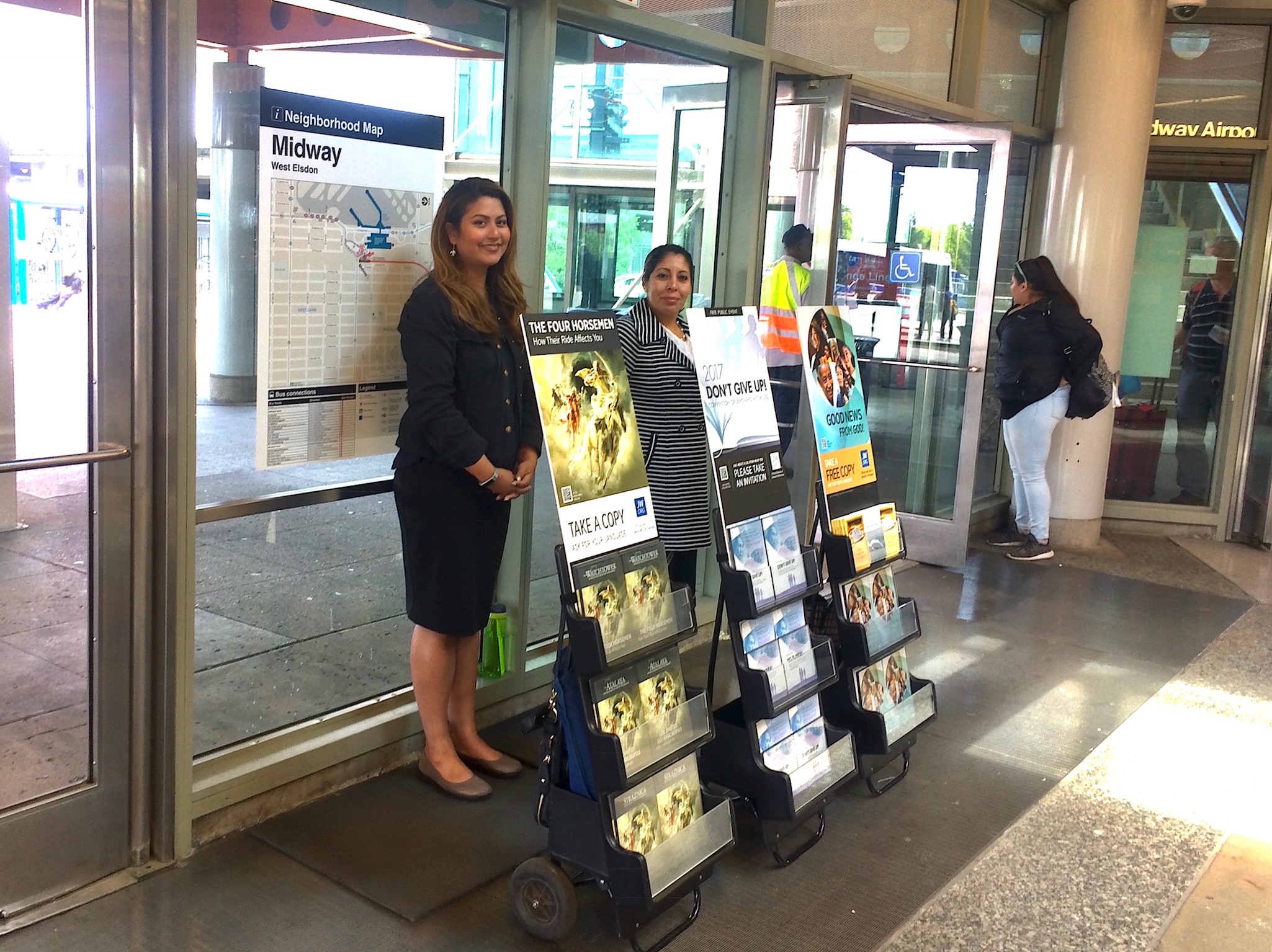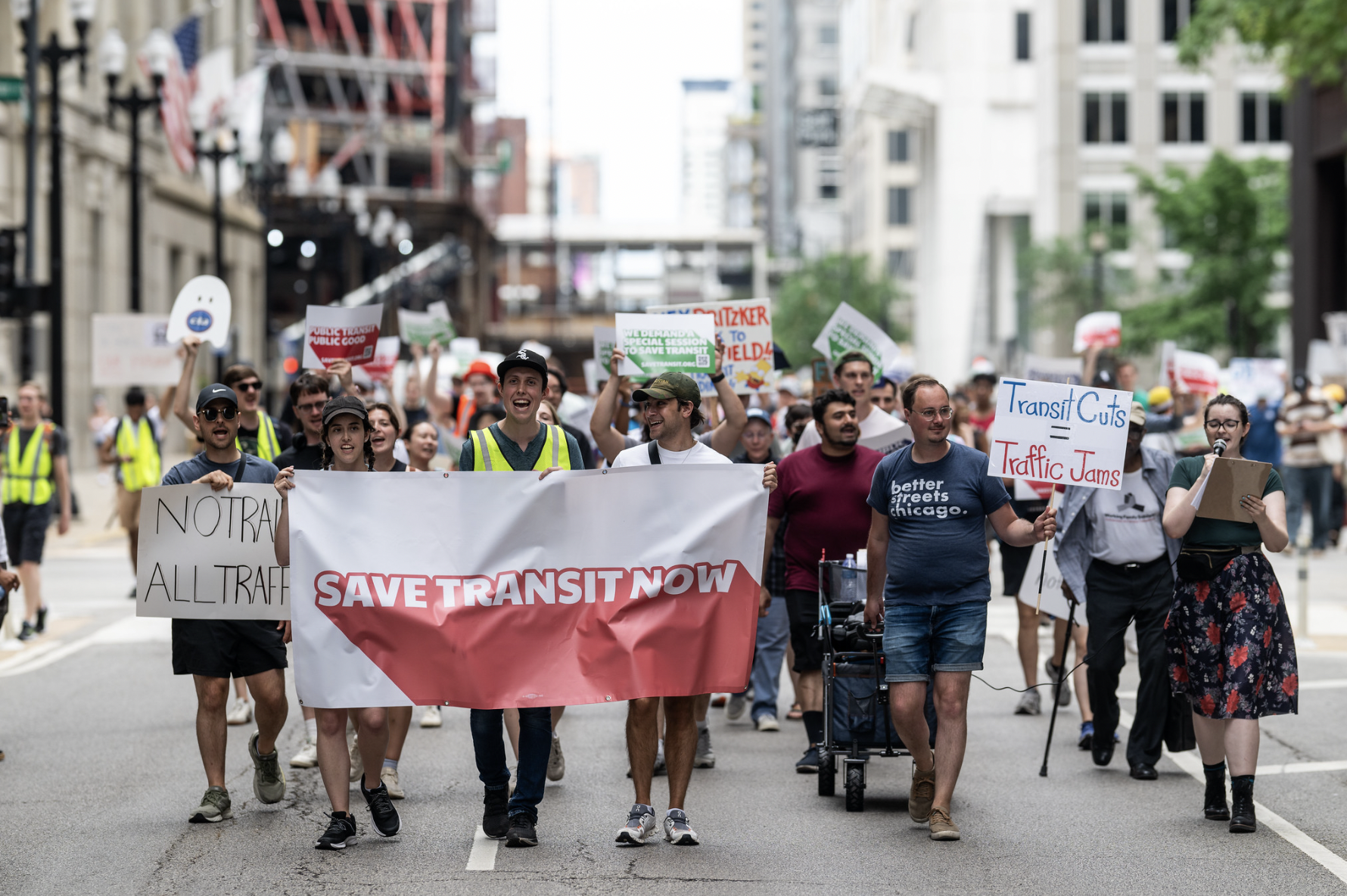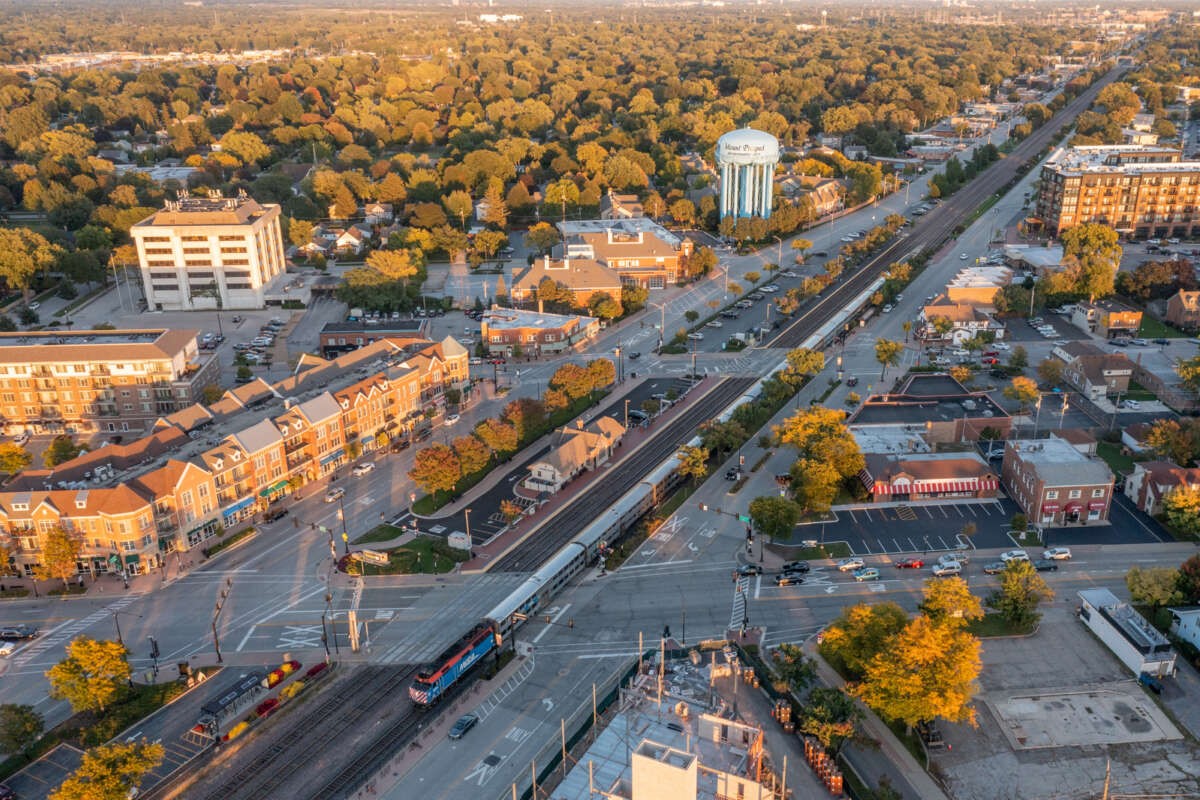[The Chicago Reader publishes a weekly transportation column written by Streetsblog Chicago editor John Greenfield. We syndicate the column on Streetsblog after it comes out online.]
“Can I get a witness?” Sure, just look for them inside your local el station.
Volunteers from the Jehovah’s Witnesses, a Christian denomination that claims 8.4 million members in 240 countries, are a common sight at CTA train stops. They stand quietly smiling with carts of religious publications, out on the sidewalk when it’s nice out, or in the “unpaid” area of the station, outside of the turnstiles, when the weather is inclement. The women are modestly, but sharply, dressed, and the men look natty as well, often wearing sports jackets and fedoras.
Though I’m not interested in converting, I sometimes stop and say hello and pick up a copy of The Watchtower or Awake! to humor them, since I find their cheerful vibe oddly comforting. They’re certainly more agreeable than the Old Navy Street Preacher, who hangs out at Randolph and State railing against fornicators and cigarette smokers.
Granted, there was one time when I experienced a bit of negativity from Jehovah’s Witnesses. It was shortly after the 2016 passing of Prince, perhaps the most famous adherent of the faith, who learned about it from Sly and the Family Stone bassist (and hip-hop star Drake’s uncle) Larry Graham. I asked a couple of young female volunteers standing near Union Station, what they thought of the late singer. They frowned, and implied that Prince wasn’t really a Witness due to his drug abuse and hypersexual onstage persona. However, that encounter was the exception that proved the rule that the Witnesses almost always appear to be in a good mood.
But not everyone appreciates the Jehovah’s Witnesses’ presence at transit stations. Kevin Havener, an Edgewater resident who often commutes via the Red Line, contacted me to share a message he sent to the transit authority, which he said they never responded to. He claimed that the Witnesses’ practice of offering literature inside el stops violated a guideline in the agency’s Rules of Conduct against distribution of written materials on CTA property.
“I find this inexplicable permission deeply, personally offensive,” Havener’s message read. “Would the CTA allow other religious proselytizing [by groups] such as [Orthodox Jews], or Buddhists, or Hare Krishnas? OF COURSE NOT. Therefore please do not allow the Jehovah's Witnesses [to do so].” (For the record, most branches of Orthodox Judaism and Buddhism don’t proselytize.)
Havener eventually revealed to me that he has a horse in this race. Around 2008 he and other members of the Buddhist Peace Fellowship activist group wanted to quietly hand out leaflets inside the Fullerton el stop in Lincoln Park. When they asked the customer assistant for permission, they were told they needed to be out on the public sidewalk, and not blocking any station doors. “That made perfect sense, and that’s what we did,” he said.
Still, it was an interesting question: Is the CTA giving the Jehovah’s Witnesses preferential treatment by allowing them to camp out in stations?
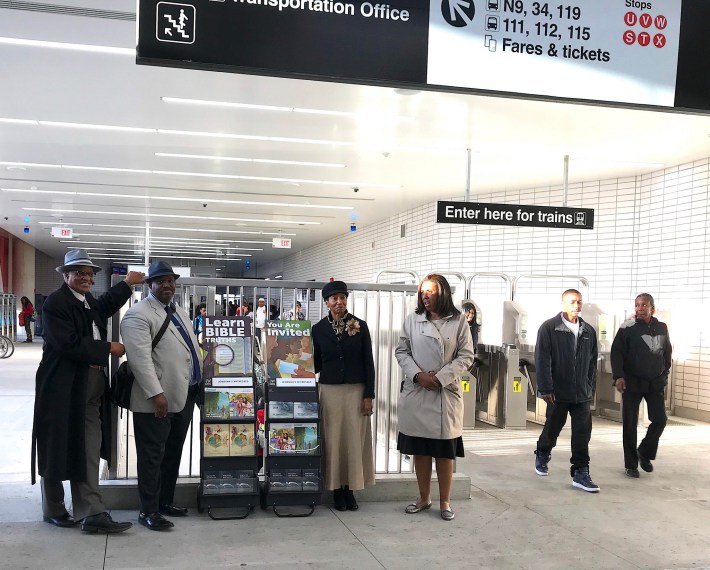
No, according to agency spokeswoman Catherine Hosinski. “The protections afforded by the First Amendment prevent the CTA from regulating the content of speech that is distributed in its unpaid area, regardless of whether it is religious, political, or social, or espouses a particular religious, political or social viewpoint.”
Hosinski directed me to guideline #23 of the Rules of Conduct, and it was clear that Havener hadn’t read the document carefully enough. “Distributing of advertisements or any other written materials or soliciting or petitioning” is indeed prohibited on trains and buses, as well as in the “paid” areas of stations. However, the rule indicates that it’s permitted in the unpaid areas, as long as it doesn’t impede pedestrian flow. So not only can religious groups proselytize inside stations, but the CTA also allows people to offer commuters fliers for appliance sales or hip-hop shows within el stops.
Martin Redish, a Northwestern professor of constitutional law, told me this policy has a precedent in the 1992 Supreme Court case “The Society for Krishna Consciousness Versus Lee.” The Court ruled that the Hare Krishnas could not do outreach within New York-area airports because they are not a “traditional public forum.” “I would argue that a train station is a traditional public forum,” Redish said. “It’s clearly better that the CTA is erring on the side of allowing free speech. Of course, if the speakers start harassing people or not taking no for an answer, you’ve got a different situation.”
Even Tom Cara, director of the local chapter of the Freedom From Religion Foundation, which advocates for separation of church and state, agreed that the CTA’s rule seems to be kosher. “We look at this the same way as we look at a public street,” he said. “Obviously people are allowed to stand out on a street corner and hand out literature if they like. If the CTA has established this space as a public forum, then the policy appears to be legal.”
Cara compared the situation to Daley Plaza during the holidays, when in addition to the city’s official “holiday tree,” different groups have been permitted to erect a creche, a menorah, and a star and crescent. Freedom From Religion puts up a nine-foot banner celebrating the winter solstice and the 1791 ratification of the Bill of Rights and a lighted “A” sign, the international symbol of atheism and agnosticism.
But if it’s OK for anyone to do low-key proselytizing or handbill distribution within the unpaid area of a CTA station, why does it seem like the Witnesses are the only ones taking advantage of this loophole, and why did the Fullerton station attendant tell the Buddhists otherwise? From talking with Paul Schmidt, the coordinator for Jehovah’s Witnesses “Bible literature displays” in Chicago, it appears that the keys are familiarity with the rules, consistently showing up at the same stations day after day, and maintaining a pleasant demeanor.
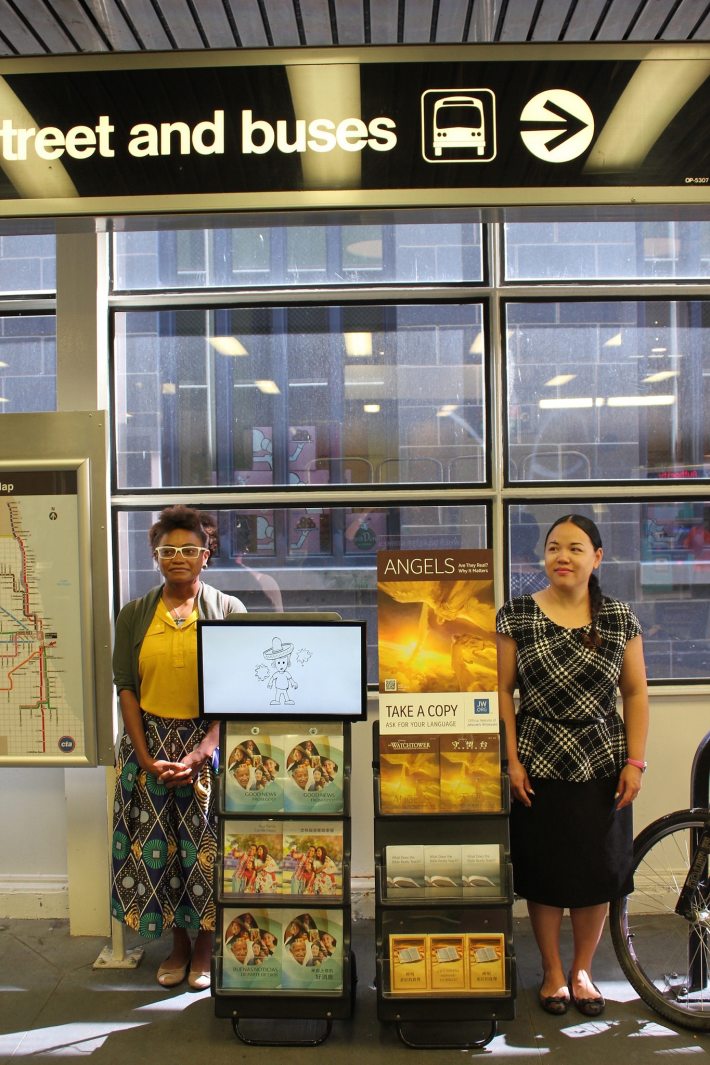
If you’ve ever had a CTA customer assistant stop you from taking a bicycle on the el a few minutes before designated rush hours – which is permissible under the CTA’s Bike & Ride rules – you know that the station attendants aren’t always familiar with the finer points of agency policy. That may explain why Havener’s group was turned down the one time they tried to canvas a station.
In contrast, Schmidt, a relaxed-sounding guy who talks with a “Fargo”-esque Minnesota lilt, told me the Witnesses have been showing up at el stations on a regular basis since 2012. He said his organization, Chicago Special Metropolitan Public Witnessing, coordinates some 1,900 volunteers from as far afield as Indiana and Wisconsin, who distribute literature 12 hours a day, seven days a week, at 19 different locations. Almost all of these are downtown CTA and Metra stations, plus Navy Pier, the UIC student center, and the Midway and O’Hare el stops.
I’ve also recently spotted Witnesses at the 95th/Dan Ryan and Wilson Red Line stations. Facebook friends told me they’ve encountered the snappily dressed evangelists at the Kedzie Pink Line and Montrose Brown Line stops, as well the Metra station near Irving Park and Pulaski, and the Jefferson Park Transit Center. Schmidt explains that neighborhood congregations have taken the initiative to staff these and other locations independently, on a more sporadic basis.
Schmidt said his organization has never formally requested permission from the CTA to proselytize (he prefers to call it “Bible education work), but volunteers usually approach the station attendant to tell them what they’re up to. “We want to make sure we’re in compliance with any laws, but also exercise our legal right to publicize our faith.”
“One of the reasons that the CTA and the police have been so good to us over the years is because we’re not aggressive,” Schmidt added. “We’re not going to shove a piece of literature in people’s faces -- we’re there if they want to talk to us.”
That doesn’t mean that the volunteers don’t occasionally get static from straphangers. “When you put your faith out there in a public setting, some people are going to disagree with you,” Schmidt said. “Some do it more vocally than others. We have the right to exercise our religion and freedom of speech, but everyone around us does too, so that’s just part of the deal.”
As for his fellow Minnesotan Prince, Schmidt takes a more charitable view than the young volunteers I discussed him with two years ago. He argued that since the Purple One was baptized as a Jehovah’s Witness in 2001, and his funeral was held at a Kingdom Hall, he should be respected as a member of the faith. “Do we idolize him? No. But he sure could play guitar, I’ll tell you that.”
